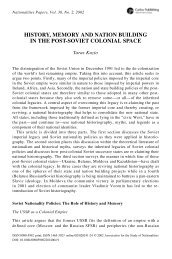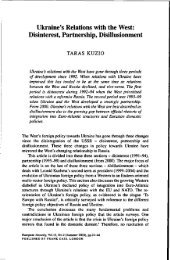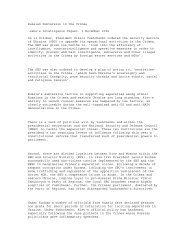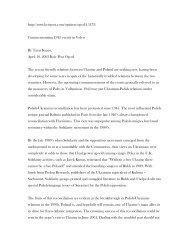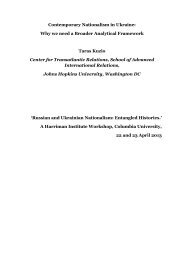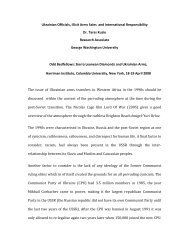Ukrainian Politics, Energy and Corruption under ... - Taras Kuzio
Ukrainian Politics, Energy and Corruption under ... - Taras Kuzio
Ukrainian Politics, Energy and Corruption under ... - Taras Kuzio
You also want an ePaper? Increase the reach of your titles
YUMPU automatically turns print PDFs into web optimized ePapers that Google loves.
Russia’s massive intervention in Ukraine’s 2004 presidential elections. One aspect of <br />
Russia’s intervention was the five year contract to supply gas at $50 per 1,000 cubic <br />
metres of gas for the Viktor Yanukovych government. As Yanukovych lost the 2004 <br />
elections the contract was torn up by Russia in 2006. <br />
In the 1990s Ukraine’s Soviet era senior nomenklatura transformed their political <br />
influence into economic power. This became apparent during the 1998 elections when the <br />
former ‘sovereign communist’ nomenklatura re‐entered <strong>Ukrainian</strong> politics in centrist <br />
parties. <strong>Ukrainian</strong> oligarchs, <strong>and</strong> corruption from the energy sector through the then <br />
newly established Naftohaz Ukrainy, provided crucial resources for Kuchma to win the <br />
1999 elections. The oligarchs played the same role as their Russian counterparts had in <br />
ensuring Borys Yeltsin’s re‐election in 1996. Naftohaz Ukrainy CEO Ihor Bakay <strong>and</strong> <br />
business ally Oleks<strong>and</strong>r Volkov (head of the Democratic Union) were political satellites of <br />
the Social Democratic united Party (SDPUo) led by Viktor Medvedchuk. The SDPUo was at <br />
the centre of the most important crises in Kuchma’s second term, the Kuchmagate crisis of <br />
2000‐2001 <strong>and</strong> the political crises between the 2002 parliamentary <strong>and</strong> 2004 presidential <br />
elections when the SDPUo led <strong>and</strong> dominated the presidential administration. <br />
The use of energy rents continued through the development of gas middlemen. <br />
First, Eural Trans Gas in 2002‐2003 <strong>and</strong> then Rosukrenergo from 2004. Rosukrenergo <br />
became a source of conflict within the orange camp in January 2006, when the <br />
Tymoshenko bloc (BYuT) voted for a parliamentary no confidence motion in the Yuriy <br />
Yekhanurov government (Yekhanurov then headed the pro‐presidential Our Ukraine <br />
bloc), <strong>and</strong> in January‐February 2008 when Yushchenko supported <strong>and</strong> Tymoshenko <br />
opposed the continued use of Rosukrenergo.



